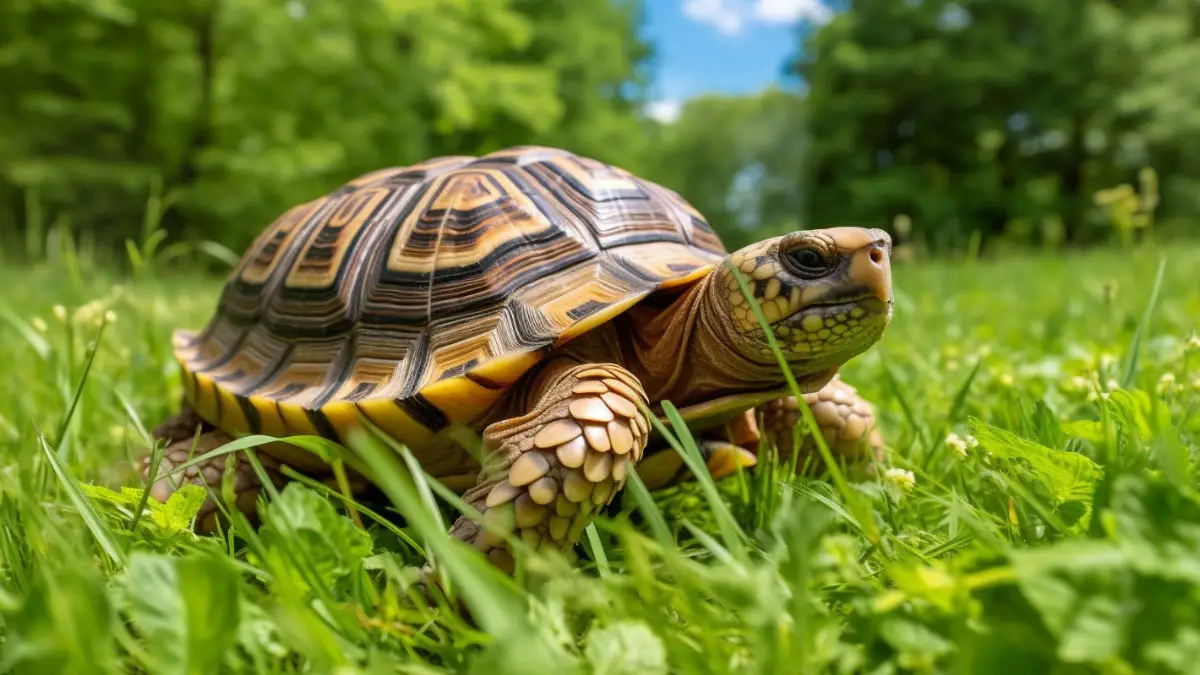Tortoise Diet: What Do Tortoises Eat?
To ensure the health and longevity of tortoises, it is crucial to understand and provide them with a proper diet. So, as a pet owner, you must know the proper dietary habits of your pet tortoises.
Tortoises are predominantly herbivorous and consume a wide variety of plants like grasses, vegetables, and leaves. Nevertheless, some tortoise species are omnivorous and consume slugs, carrion, and insects in the environment.
The knowledge of tortoise’s specific dietary needs enables you to create a nutritionally balanced menu that meets all their nutritional requirements. In this article, we will explore a well-balanced tortoise diet and introduce you to the essential components that contribute to their overall well-being.
What Do Tortoises Eat?
Contents
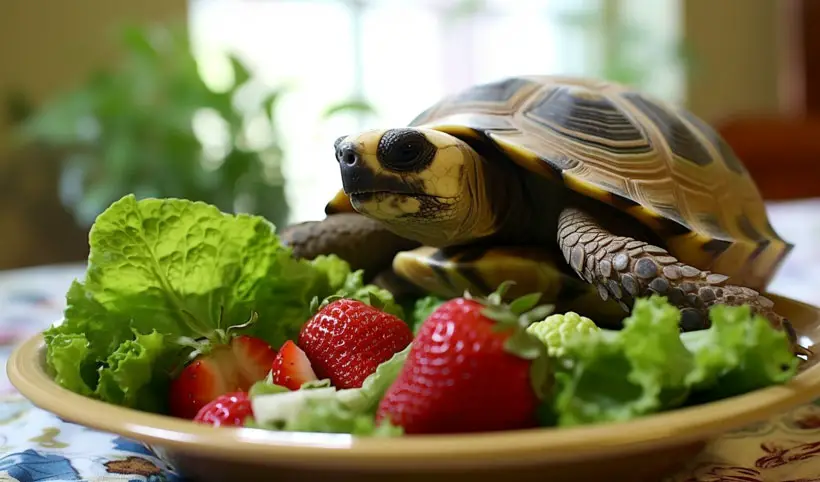
Tortoises have specific dietary needs based on their species and natural habitat. But sometimes, the specific diet may vary depending on the tortoise’s origin and size. Their diet generally consists of the following components:
| S/N | Food Category | Nutrients Provided | Precautions |
|---|---|---|---|
| 1 | Leafy Greens | Vitamins (A, C, K) | Avoid high-oxalate greens |
| Minerals (Calcium, Iron, Magnesium) | Offer a variety of greens to ensure a balanced diet | ||
| Fiber | |||
| 2 | Grass Hay | Fiber | Ensure high-quality hay free from dust and mold |
| Introduce gradually | |||
| 3 | Vegetable | Vitamins (A, C, K) | Avoid feeding vegetables high in oxalates |
| Minerals (Calcium, Potassium) | Introduce new vegetables slowly | ||
| Fiber | |||
| 4 | Edible Weeds | Vitamins (A, C) | Collect from pesticide-free areas |
| Minerals (Calcium, Iron) | |||
| Fiber | |||
| 5 | Calcium and Supplements | Calcium | Consult a veterinarian for appropriate supplement dosage |
| Vitamin D (if supplemented) | |||
| 6 | Limited Protein | Essential amino acids | Offer protein sources sparingly to avoid imbalances |
| Protein for growth and repair | Monitor protein intake | ||
| 7 | Hydration and Soaking | Hydration | Ensure fresh water is always available |
| Skin health | Monitor soaking time |
1. Leafy Greens
These plant-based foods provide essential fiber, vitamins, and minerals that are vital for a tortoise’s digestive system and overall nutritional balance. Incorporating a variety of leafy greens and grasses into their diet ensures a diverse and enriching meal for these fascinating reptiles. These are nutrient-packed greens, such as
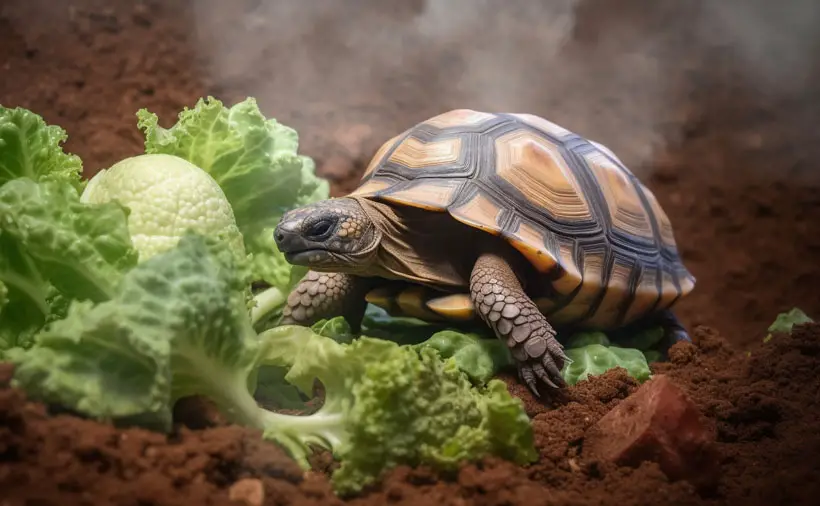
- Dandelion greens
- Collard greens
- Kale
- Mustard Greens
- Turnip Greens.
2. Grasses
Grasses are essential for tortoises. These provide roughage and additional fiber, which aid in maintaining proper gut health and wear down their beaks. A few examples of these grasses are-
- Bermuda grass
- Timothy hay
- Orchard grass
- Meadow hay
- Rye grass
When offering hay to tortoises, ensure it is clean, free from dust or mold, and stored in a dry environment. Fresh hay should be provided regularly to maintain its nutritional value.
3. Vegetables
Including various vegetables in a tortoise’s diet adds nutritional diversity. They are great options that offer vitamins and minerals necessary for their well-being. However, it is important to introduce new vegetables gradually to monitor any adverse reactions. Examples of correct vegetables for a tortoise are-
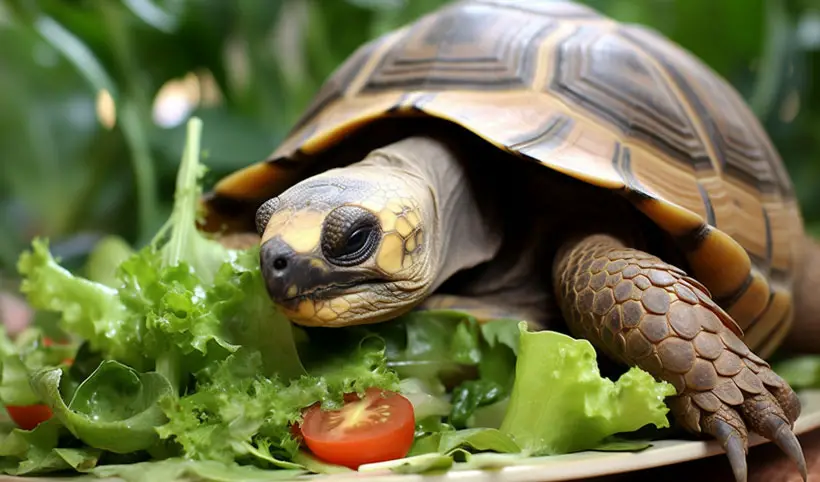
- Carrots
- Bell peppers
- Squash
- Zucchini.
While vegetables are generally beneficial, it’s important to be cautious with high-oxalate vegetables. The oxalate contributes to the formation of calcium oxalate crystals in tortoises. Examples of high-oxalate vegetables include Spinach, beet greens, and rhubarb.
While these vegetables can be included in moderation, it is advisable to balance them with low-oxalate options. Hence, don’t rely on them as the primary source of greens.
4. Edible Weeds
These nutrient-rich weeds are often readily available. The weeds provide tortoises with additional vitamins, minerals, and fiber. Incorporating edible weeds into a tortoise’s diet adds variety to their meals, promoting a more natural and stimulating feeding experience.
The different textures, flavors, and scents of weeds can enhance their foraging behavior and overall well-being. Examples are-
- Dandelion greens
- Plantain
- Clover
- Hibiscus leaves
- Mulberry leaves.
When collecting weeds for your tortoise, ensure they have not been exposed to pesticides, herbicides, or other chemicals. Avoid areas near roads with heavy traffic or places where toxins may be present. It’s best to collect weeds from pesticide-free gardens or organic sources to ensure their safety.
While edible weeds can offer nutritional benefits, it is important to incorporate them as part of a varied diet. Balance the intake of edible weeds with other components, such as leafy greens, grasses, and commercial tortoise diets.
5. Limited Protein Sources
Protein plays a vital role in tissue repair, growth, and overall body function in tortoises. Tortoises require a small amount of protein for growth and repair. Treats like cooked eggs, snails, or mealworms can be offered occasionally.
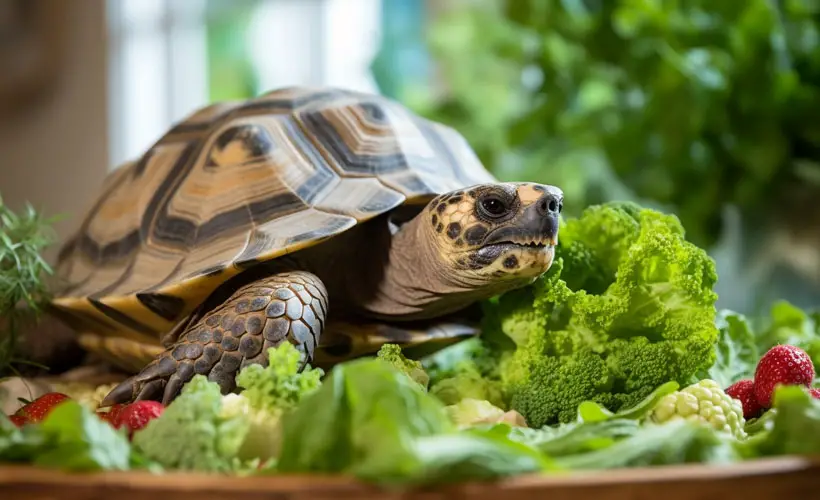
Animal-based protein, such as insects or meat, should be limited or avoided altogether, as tortoises are primarily herbivorous. Instead, focus on plant-based protein sources, including
- Legumes
- Lentils.
It is crucial to monitor and balance their protein intake. Excessive protein consumption can lead to kidney damage, shell deformities, and other health problems. Consult with a reptile veterinarian or herpetologist to determine the appropriate protein levels for your tortoise’s specific species and age.
6. Calcium Supplements
Calcium is vital for healthy shell buildup, muscle function, and bone development in tortoises. However, it is important to consult a veterinarian to determine the appropriate dosage and prevent over-supplementation. Providing calcium supplements, such as
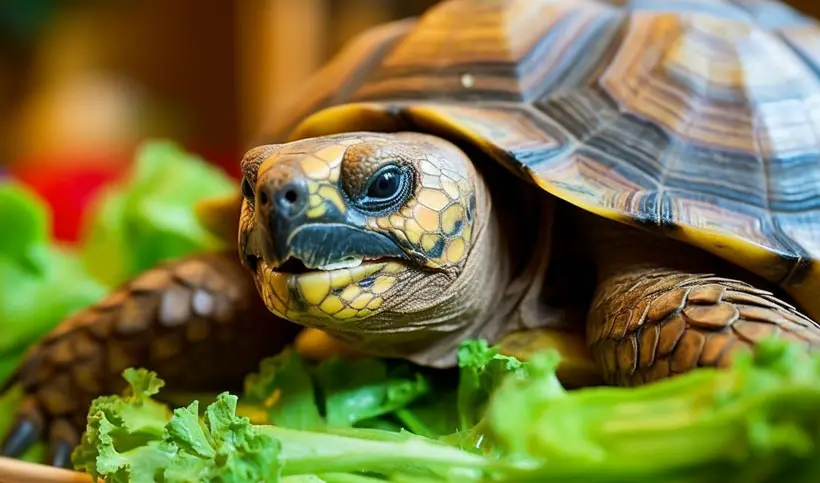
- Calcium Carbonate Powder
- Cuttlebones
- Liquid Calcium Supplements
Remember, excessive or imbalanced calcium supplementation is harmful to tortoises, leading to health issues like metabolic bone disease.
7. Hydration
Fresh, clean water should always be available for drinking, and a shallow water dish can be provided for soaking. Adequate hydration supports overall health, aids in digestion, and contributes to proper shedding.
Soaking provides opportunities for hydration and helps prevent dehydration, particularly in drier environments or during warmer periods. Additionally, soaking can aid in shell health by promoting proper shedding and preventing shell dryness or pyramiding.
As a general guideline, providing a soak once or twice a week for around 15-30 minutes can help ensure proper hydration.
When preparing a soaking area, use lukewarm water that is shallow enough for your tortoise to comfortably immerse itself. Ensure the water level is below the chin to prevent accidental ingestion.
8. Commercial Diets
These diets come in pre-packaged forms that are easy to store and serve. They provide a consistent and reliable source of nutrition, especially during times when fresh food options may be limited.
Additionally, commercial diets often include a mix of ingredients that mimic a tortoise’s natural diet, providing a diverse range of nutrients.
While commercial diets provide a solid foundation, it’s still important to supplement them with fresh foods. Also, fruits can be given as treats in moderation, and occasional animal products like insects or small amounts of cooked lean meat can be added for variety.
What Factors Influences Tortoise Diet?
Tortoises live worldwide and have diverse diets based on prevailing factors around them. For instance, some tortoises have higher protein requirements, while others tend to consume more water. Here are the factors.
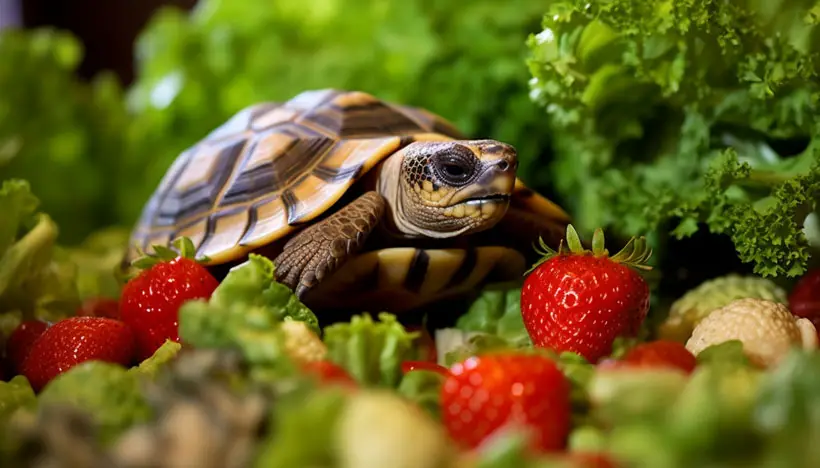
- Type of species
- Age
- Health and reproductive status
- Natural habitat
- Seasonal variations
- Environmental factors such as temperature, humidity, and rainfall
These elements determine the availability of food sources and the specific vegetation or prey items that tortoises rely on for sustenance.
What Do Tortoises Eat in The Wild?
In their natural habitats, tortoises exhibit remarkable dietary adaptability. Most tortoises are herbivores and graze on a variety of plants, including leaves, grasses, and edible fungi.
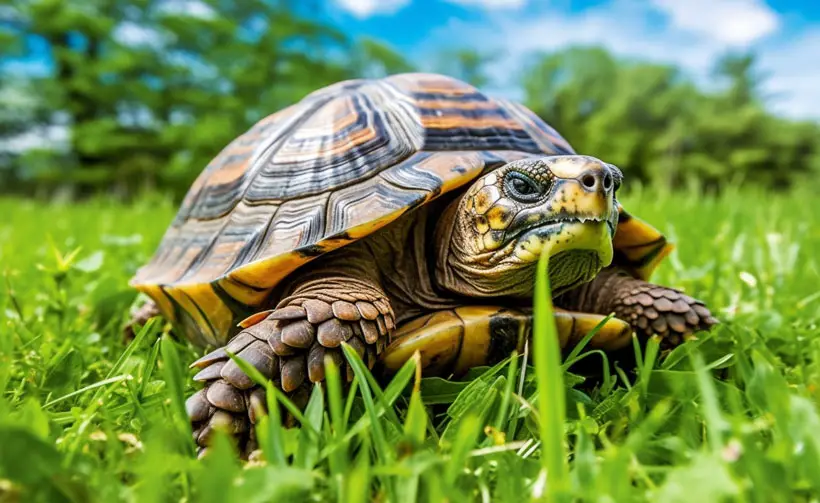
They are known for their ability to consume tough, fibrous vegetation, making them adept at utilizing available plant resources. However, some tortoise species have evolved to display omnivorous tendencies, incorporating insects, slugs, and even carrion into their diet.
Foods to Avoid in Tortoise Diet
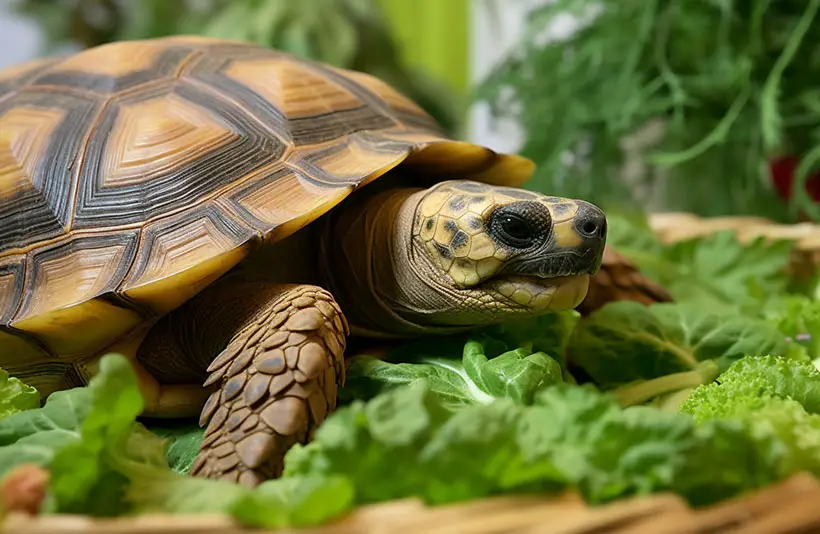
When it comes to feeding your tortoise certain foods should be avoided to ensure their well-being and safety. Here are some key points to consider:
- Foods High in Oxalates: Avoid feeding your tortoise foods that are high in Oxalates. This can interfere with calcium absorption and contribute to the formation of kidney stones. Examples of high-oxalate foods include spinach, beet greens, and rhubarb.
- Foods High in Protein: Minimize feeding tortoises high-protein foods like animal-based products, including meat, dairy, and eggs.
- Foods High in Sugar: Tortoises have a low tolerance for sugar. So it’s best to avoid feeding them sugary fruits, processed foods, and sweet treats. Excessive sugar consumption can disrupt their digestive system and lead to weight gain and other health problems.
- Toxic Plants: It is crucial to be aware of and avoid feeding your tortoise any toxic plants. Certain plants, such as daffodils, lilies, and azaleas, can be toxic to tortoises if ingested.
FAQs
Here are other questions people also ask about the Tortoise diet.
No, tortoises do not drink milk. Tortoises are not designed to digest the nutrients found in milk, as they are not adapted to process lactose, the sugar present in milk. This is why it is advised against giving them any.
The feeding frequency for tortoises can vary depending on their species, age, and individual needs. As a general guideline, most adult tortoises can be fed once a day, while younger tortoises may require more frequent feedings.
Tortoises do not actively eat at night. Tortoises are diurnal creatures, which means they are primarily active during the day. They tend to be more active and feed during daylight hours.
Final Words
By providing a balanced and nutritious diet, you can ensure that your tortoise thrives. Remember to include a variety of foods such as leafy greens, vegetables, and fruits in their meals.
It is also essential to consult with experts, such as reptile veterinarians or herpetologists about your pet tortoise’s diet. This will help you to get personalized guidelines based on your tortoise’s specific dietary needs.
By following these guidelines and seeking professional advice, you can provide your tortoise with the optimal diet. As well as promoting their longevity and happiness as cherished reptile companions.

